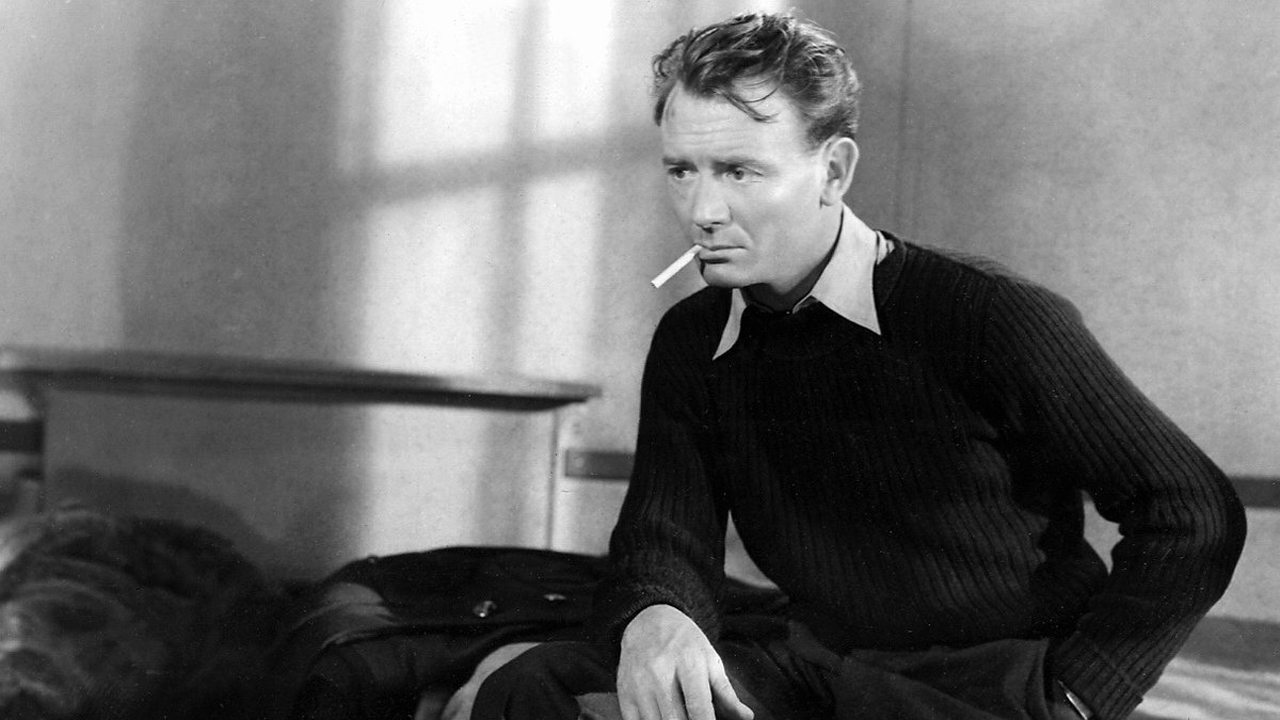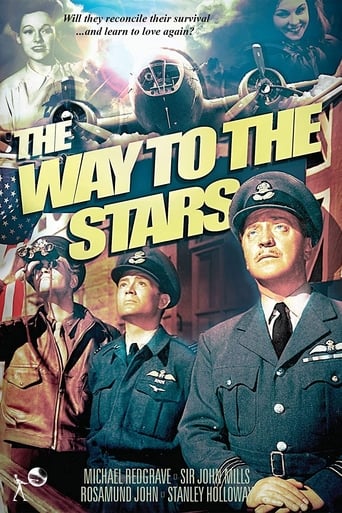

How wonderful it is to see this fine actress carry a film and carry it so beautifully.
... View MoreThis is one of the few movies I've ever seen where the whole audience broke into spontaneous, loud applause a third of the way in.
... View MoreThis is a dark and sometimes deeply uncomfortable drama
... View MoreThe film's masterful storytelling did its job. The message was clear. No need to overdo.
... View MoreJohn Mills gives yet another sturdy, competent, though somewhat colorless performance playing an amateur Pilot Officer in England, 1940; he's the new man on the squadron of professional fliers, and has to prove himself in the ranks before he can gain confidence. This portrait of activity and camaraderie on a British bomber base is vivid and emotional without being exceptionally exciting. Overrated by most critics, it certainly was a timely picture (with the action wrapping up in 1944), and the performances by the large cast (including Michael Redgrave, Trevor Howard, and David Tomlinson) are uniformly excellent. The opening sequence set in the now-empty hangar and barracks strikes a somber tone, and indeed there is much life-and-death heartbreak and melodrama on hand, though the finale has a hopeful, nearly-upbeat spirit. It's a heartfelt film, though the editing is lax (particularly involving a plane crash and a silly bit with a cigarette lighter that tends to spell bad luck for its owners!) and the midsection sags a bit from the weight of too many issues. Anthony Asquith's direction is solid; he wisely keeps the introductions and chit-chat to a minimum and instead concentrates on the personalities and feelings of the soldiers and their ladies. Watch for a young Jean Simmons, astonishingly lovely and perky as a singer in the mess hall. **1/2 from ****
... View MoreThe great thing about this war flying film is that there's hardly any flying in it. It's all about the terrible toll war takes on normal people. What makes it so gripping to a modern audience is how the characteristic emotional restraint of people at that time is so faithfully portrayed. That's why it doesn't date. You just know that's how people really were back then.Above all, it's the Rattigan screenplay, with its wonderful trilogical structure that speaks out.If you want to see how people really felt and acted in England in WW2, in a beautiful, tragic film, then you must see it.
... View MoreThis is one of those 'period' films replete with the kind of dialogue that we've heard 'sent up' a thousand times and responded to the send ups by laughing at them but this film that SHOULD be faintly risible holds the attention and inspires tears rather than laughter. This is probably because it is as finely crafted as a Faberge egg or a Louis VIII commode. The screenplay is the work of Terence Rattigan, one of the finest English playwrights of the 20th century - indeed even a cursory glance at the relationship between Joyce Cary and her niece Renee Asherson reveals a blueprint for the Mrs Railton-Bell and daughter Sybil in Rattigan's Separate Tables which lay a good ten years in the future - who could and did turn his hand to the screenplay usually successfully as in The Sound Barrier. Michael Redgrave, destined to star magnificently in Rattigan's The Browning Version (directed, as here, by Puffin Asquith)stands out as the dashing and charming pilot who disappears far too soon having flown without his 'lucky' lighter and gone down in flames. Rattigan's strength as a writer of wartime drama is in concentrating on the people rather than the battles so that the planes are seen taking off and landing at Halfpenny Field and that is all. The ensemble cast complement each other perfectly from John Mills raw recruit maturing into a leader to Stanley Holloway's hotel bore. One of the finest of its kind.
... View MoreIn 1940 trainee pilot Peter Penrose joins up with the RAF in an airbase in England and is taken under the wing of the more experienced Flight Lt David Archdale. Archdale is happy go lucky, a great pilot and has a young wife and new child. So when Archdale is killed in a sortie over enemy territory it causes Penrose to withdraw into himself losing contact with his sweetheart and shutting himself off to be able to commit himself to the job.In 1942 the RAF mostly move off the field to be replaced by the Americans who come to be stationed with Penrose and a few other officers. His pain is only one of the troubled interactions and losses to be suffered during this war.This film is the third film from Asquith that I have seen in the last 24 hours I didn't know he directed them all, I just had them lined up to see and it turned out to be a mini-season of his films. This film opens with a wonderfully atmospheric scene where the camera picks over the bones (not literally) of the now deserted airbase before we jump back in time to see the stories behind the remains. This is a great opening and the rest of the film never really gets up to the same standard even though it does try to deliver a less flag waving look at the human side of the war. It tries to show how loss affects the other pilots (namely Penrose) and also how difficult 'normal' relationship were when so many people were dying; however it has dated badly and the people portrayed are much too stiff and proper. In fairness, at the time, even an honest film would have shied away from showing the pilots really struggling with emotions, but even still the film is certainly not a heroic propaganda piece.The lack of real emotion means that the story itself comes across as rather stiff and, as a result, can occasionally lose the audience not having any excitement in it to cover the emotional involvement that it lacks. The message is honourable but it has been done better recently simply because the emotion is more relatable and tangible; I support the idea of the stiff upper lip and all that, but in the film's private moments it should have let this drop to show more of the real people. Aside from this, a large section of the film seems to be more about cementing UK/US relations than about any specific story as it is filled with 'oh look how funny are differences are' moments which are OK but hardly hilarious or anything special. The characters follow the script and are mostly upright people and genre clichés however it is a good thing that they are not the 'perfect' soldiers of many other war films of the period.Without real characters to really work with the cast just deliver the best they can, many giving the same performances they have in plenty of other films like this. That is not necessarily a bad thing though as the cast features a lot of really well known names and faces. Mills is good and he is the one that manages to convey the inner hurt and emotional sacrifice the best; of course he never goes over the top or even sheds a tear but he does a lot with his facial expressions. Redgrave is a good casting choice and his familiarity as a leading man means that we feel his loss a lot more than if he had been a bit player brought in just to die. Montgomery is his replacement but in terms of acting he cannot do it he is a bit too 'all-American' and unconvincing in his own skin. The support cast is mostly good and features many well known actors of the genre including John, Holloway, Howard, Radford, Owen and others.Overall this is a good film in what it tried to do and maybe at the time it worked really well surrounded by flag waving films of heroic sacrifice and espionage b-movies, but not the lack of tangible emotion has caused it to date quite badly. In some places emotion and feeling is apparent but mostly it is all too stiff and unconvincing, leaving the audience to a lot of the work. Still clever, interesting and worthy enough to be worth seeing, just don't expect it to be as impacting as more obvious modern war movies.
... View More